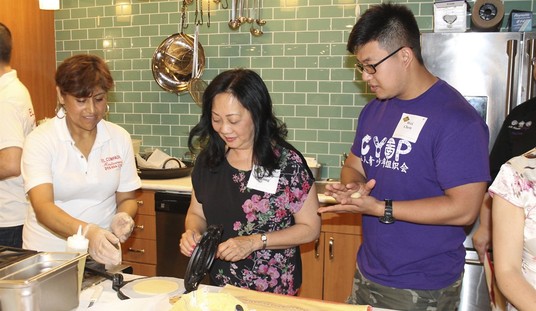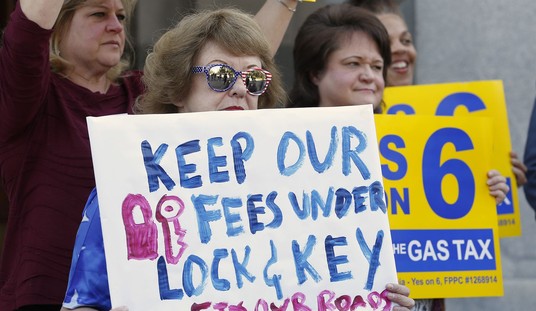HBO’s hit show “Game of Thrones” cleaned up at the Emmy Awards last month, and actress Gwendoline Christie praised the show as “progressive.” Christie, who stars in unconventional female roles in each franchise, focused on the “progressive” view of women in “Star Wars” and “Game of Thrones,” contrasting it with the allegedly sexist characterization of women in other sci-fi and fantasy series.
Nevertheless, the political themes of the hit HBO show do not fit neatly into a liberal mold, and some might even argue they are conservative.
Why “Game of Thrones” May Seem Liberal
Christie lumped “Star Wars” and “Game of Thrones” with the final installment of the Hunger Games trilogy — “Mockingjay, Part 2.” She has roles in all three upcoming releases. “All three projects are incredibly progressive, so it feels as though everyone’s caught up the the idea of that, and everyone’s dedicated to giving their absolute best to honoring the set of ideas and setting them forth into the world,” Christie told Variety.
Christie is far from the only voice calling the show liberal or progressive. Some have praised the show for including an openly bisexual character, while others tie in various themes to climate change, or praise the “struggle against tradition” involving the rise of a radical religious group in the latest season.
CNN’s John Blake presented a strong case in “How ‘Game of Thrones’ is like America,” arguing that the show’s themes are meant as a subtle critique of America’s struggles. He mentions sexism — how strong women break through a male-dominated society in both the show and, allegedly, the United States — debt, race, climate change, immigration, and the “1 percent.”
Many of the connections between the struggles of “Game of Thrones” and liberal/progressive causes are tenuous at best, like the connection between the ice zombie “White Walker” threat and climate change. George R. R. Martin, author of “A Song of Ice and Fire,” the book series behind the show, broadly identifies as liberal, but that does not mean his fantasy series is overtly political or lacks conservative themes as well.
The Conservative Themes in “Game of Thrones”
As in all good literature, “Game of Thrones” presents values and facets of the human condition which can be championed by people across the political spectrum. The real meat of the show is portraying moral conflict in individuals — and showing the true heroism in a flawed human being. This complex view of morality may indeed argue for a more conservative approach.
Martin aimed to create a morally complex world. “The sort of fantasy where all the people get together to fight the dark lord doesn’t interest me,” he told The New Republic in 2013. Martin works to present “stories of the human heart in conflict with itself,” using such themes as “love and honor and pity and pride and compassion and sacrifice.”
This mixture of good and evil in each character arguably reflects the Christian understanding of mankind. Created in the Image of God with minds, souls, and moral agency, men and women nevertheless carry the stain of sin. Even the saved struggle to do good, as St. Paul writes.
This internal conflict, rather than erasing virtue, accentuates it. As The Federalist’s Lachlan Markay observes, the heroes in “Game of Thrones” “do both good and bad things, making it all the more interesting — and heroic — when they embrace the better angels of their nature.”
The heroism of virtuous characters like Gandalf and Aragorn in “The Lord of the Rings” proves inspiring, but also seems out of reach. One of these characters is a wizard, and the other carries long life and kingship in his very blood. “Great deeds in a fallen world are more interesting — and arguably more inspiring — than those carried out simply because doing so is in a character’s DNA,” Markay argues.
Heroism emerges throughout the show: when self-described coward Samwell Tarly kills a terrifying ice zombie to save a woman and her infant son, when a blacksmith leads four soldiers to their deaths by standing his ground against a giant, and when a dwarf leads a nearly hopeless charge against a much larger army.
Political Lessons
Beyond even this heroism and an arguably Christian view of moral struggle, “Game of Thrones” also presents the political challenges to kingship. Far from arguing for a large, liberal-progressive state, the show seems to point in the direction of a small, limited government.
In referencing the rampant evil in “Game of Thrones,” Markay asks “what better reasons to withhold the power of the state from anyone, even the most seemingly virtuous?” When one man rules, with no checks and balances to restrain him, the lives and wellbeing of others are forfeited, and even worse, the death of a king sparks a violent struggle for control — the “Game of Thrones” mentioned in the title of the show.
As Matthew Continetti wrote in the Claremont Review of Books, “absent the rule of law, and with the exception of revolution, only a code of ethics might restrain a potential despot.” In “Game of Thrones,” the wicked boy-King Joffrey Baratheon proves just how badly a monarchy can go wrong. Joffrey tortures innocents, shows no mercy, and spurns advice. He is a bully king.
Why “Game of Thrones” Succeeds
In the end, “Game of Thrones” stands above political partisanship, and appeals to very wide audiences. While “Game of Thrones” has undoubtedly alienated some potential viewers with sex and violence, its themes appeal to both believers and non-believers alike, conservatives and liberals. The show’s political intrigue makes it a joy to talk about.
A female villain in “Star Wars” will certainly be something new — while the strong character Gwendoline Christie plays in “Game of Thrones” has been around since the second season in 2012. The portrayal of women as more than just targets of male affection or “damsels in distress” has brought a realism to “Game of Thrones,” and fits in well with its overarching themes. A show need not be “progressive” to present complex female characters.
Progressive or not, the next season of “Game of Thrones” will be welcomed by a universe of fans. It may even feature the resurrection of a certain main character who died in Season 5…
So long as the next season continues to present conservative themes and compelling stories, it should continue to succeed. Winter is Coming — let’s hope the next book in the series, “The Winds of Winter,” is coming, too.










Join the conversation as a VIP Member